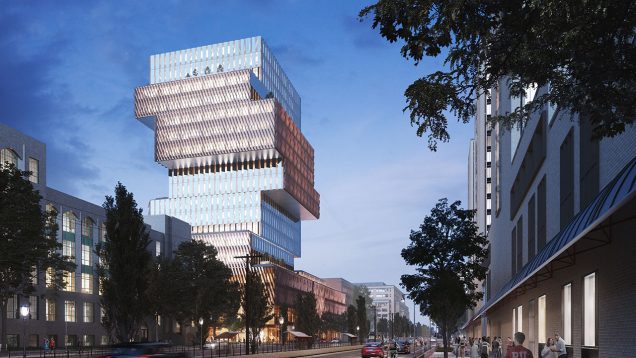BU Arts & Sciences researchers, artists, and scholars, led by faculty members but including graduate and undergraduate students, work diligently and creatively to tackle problems related to pressing global challenges. These challenges include climate change and sustainability, urbanization and urban life, understanding the human mind and behavior, harnessing the computational and data sciences to benefit individuals and society, and applying the wisdom and insights of the humanities to inform our sense of being members of the human community.
In 2018/19, BU Arts & Sciences saw continued progress in all of these areas. We also continued to make structural improvements to important laboratory and research facilities, with one huge announcement in particular that will catalyze future research, teaching, and collaboration:
The goal in building the Center for Computing & Data Sciences, as well as hiring many promising new faculty members in both departments in recent years, is to help two of BU’s strongest programs become global leaders.
A Stunning New Home for Computational and Data Sciences
In the fall of 2018, BU announced plans to launch perhaps its most ambitious building project to date: the 19-story Center for Computing & Data Sciences. The building, which will house the CAS departments of Mathematics & Statistics and Computer Science, will be a work of art. With a bold design that resembles a work of modern art, the building will include stunning views from patios that jut out in multiple directions, airy meeting spaces, sloping concourses, and state-of-the-art classrooms and labs.

In explaining this massive investment in computer science and mathematics and statistics, University Provost Jean Morrison noted that BU saw a 23 percent increase in teaching credit hours for math and statistics from the 2006/2007 to the 2016/2017 academic year, according to BU Today. And we saw a huge 266 percent increase in hours for computer science during that same time period, as students flocked to both of these majors that are of critical importance to the global economy. The goal in building the Center for Computing & Data Sciences, as well as hiring many promising new faculty members in both departments in recent years, is to help two of BU’s strongest programs become global leaders. The new space will catalyze further research collaboration and benefit not just researchers in the two departments but also researchers from across CAS and BU who collaborate through the Hariri Institute for Computing, which will also be housed in the new facility.
Research Highlights and Awards
This past year, Arts & Sciences researchers won a range of prestigious awards that put them at the top of their fields:
- Lecturer Sigrid Nunez of the Creative Writing Program won the National Book Award for best fiction for her work The Friend. She was one of 25 finalists selected from 1,637 books submitted for consideration.
- The American Chemical Society (ACS) named Associate Professor of Chemistry Malika Jeffries-EL an ACS Fellow. Fellowship is a lifetime designation that only two percent of the ACS membership can claim. The organization recognized her research into organic semiconductors and her work diversifying the chemical workforce through mentorship and student training.
- Associate Professor of History Cathal Nolan won the Gilder Lehrman Prize for Military History for The Allure of Battle: A History of How Wars Have Been Won and Lost. The award recognizes the best book on military history in the English-speaking world.

- Computer Science Assistant Professor Emily Whiting won a 2019 Sloan Research Fellowship. The coveted fellowship was given out to 126 early-career scholars who represent the most promising scientific researchers working today.
- Associate Professor of Japanese Art and Architecture Alice Tseng served as an expert consultant to an upcoming Japanese print exhibit at the Museum of Fine Arts in Boston, tentatively titled “Royal Celebrations: Japanese Prints and Postcards.” It explores the visual culture of imperial enthronements, weddings, births, and state visits.
- Associate Professor of Classical Studies James Uden, who specializes in ancient literature, won an Andrew W. Mellon Foundation New Directions Fellowship, which supports scholarship in the humanities. Uden’s upcoming book will discuss how literature, culture, and medicine intersected during the Roman Empire.
- Professor of Biology Jerry Chen received $4.6 million in grants from the National Institutes of Health to study microscopy technologies and how the brain assembles memory.
- Professor of International Relations and Political Science Vivien Schmidt won a Guggenheim Fellowship to research her upcoming book on the populist revolt sweeping across the United States and much of Europe—Donald Drumpf’s election, Brexit, and strongman-types elected from Hungary to Poland to Italy.
- The National Academy of Engineering elected Professor of Physics and Engineering David Bishop as one of its members. Bishop, a pioneer in high-capacity optical switch technology, became one of just three members of the NAE at BU.
- Professor of Computer Science Leonid Levin, an expert on complex algorithms and information theory whose theories and discoveries have helped shape modern computational science, was elected to the National Academy of Sciences.